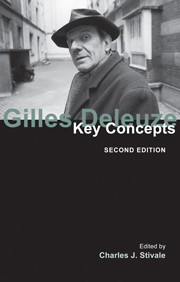16 - Critical, clinical
from Part III - FOLDS
Summary
The last book Deleuze published before his death in 1995 was a collection of essays entitled Critique et clinique (1993), which included articles devoted to “clinical” analyses of various philosophers (Plato, Spinoza, Kant, Nietzsche and Heidegger) and literary figures (Artaud, Beckett, Carroll, Alfred Jarry, Kerouac, D. H. Lawrence, T. E. Lawrence, Masoch, Melville and Whitman) (see ECC). The idea that artists and philosophers are physiologists or symptomatologists, “physicians of culture”, was a notion first put forward by Nietzsche, for whom all phenomena are signs or symptoms that reflect a certain state of forces. Deleuze took this Nietzschean notion in new directions in his writings, using it to explore the complex relationships between psychiatry and medicine, on the one hand, and philosophy, art and literature, on the other. “The critical (in the literary sense) and the clinical (in the medical sense)”, he once wrote, “may be destined to enter into a new relationship of mutual learning” (M: 14).
Deleuze first posed the question of the relationship between the “critical” and the “clinical” – in his 1967 book Masochism: Coldness and Cruelty – in the context of a concrete question: why were the names of two literary figures, the Marquis de Sade and Leopold von Sacher-Masoch, used as labels in the nineteenth century to denote two basic “perversions” in clinical psychiatry? What made this encounter between literature and medicine possible, Deleuze suggests, was precisely the distinctive status of symptomatology within the context of medicine itself.
- Type
- Chapter
- Information
- Gilles DeleuzeKey Concepts, pp. 204 - 215Publisher: Acumen PublishingPrint publication year: 2011

